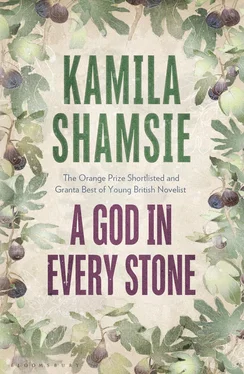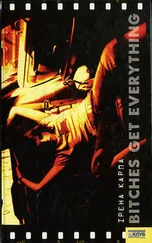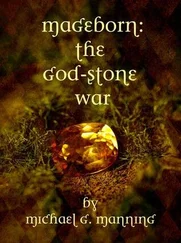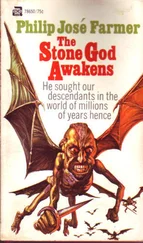— So, the Pactyike. .?
— Yes. You, Najeeb Gul. You are Pactyike. He’s writing about the Pathans. Turn to the page with the bookmark. They — you — appear again.
Others however of the Indians are on the borders of the city of Caspatyrus and the country of Pactyike, dwelling towards the north of the other Indians. . these are the most warlike of the Indians. .
He stopped reading there.
— Miss Spencer, may I ask you something?
— Of course.
— Have you ever met anyone who’s been to war?
— Many. Very many.
— Do they ever become the way they were before?
— I don’t know. I’ve only known them in the middle of war, not after. Why do you ask?
— I just wondered. May I go now? It’s getting late.
— Yes, of course.
— And may I come back tomorrow?
— Yes. Of course.
— I hear you’ve found yourself a civilising mission.
Remmick reached over the gate to undo the bolt, and gestured for her to go ahead of him along the garden pathway toward the ‘modest’ bungalow available to rent.
— You work for Empire in large ways, Mr Remmick, I work in small ways. Oh, this is perfect!
She walked past the Ionic columns supporting a red-tiled sloping roof and in through the doorway to a darkened interior. Remmick, following, closed the door behind him and touched her waist — when she quickly moved away, he apologised. Can’t see a thing in here. There was a sound of something rusty being eased, and the sunlight rushed in, revealing a high-ceilinged corridor and Remmick standing beside the heavy wooden window shutters, one hand on the bolt. Beyond the corridor was a spacious room with a large writing desk at its centre, facing shutters that reached from floor to ceiling. Viv opened them and stepped out into a garden bordered with a line of trees bearing flame-coloured flowers; and at the far end, a weeping willow. Perfect, she repeated, stepping out onto the verandah.
— I still think it would be better if you were at Dean’s.
— You’re very kind, but I’ll be perfectly all right on my own.
— Will he come here for lessons? Your civilising mission?
— His name is Najeeb, and yes.
— A Pathan is a Pathan at any age, I hope you remember that. They’re not accustomed to the company of women.
— I would swear this one has Greek blood in him. I call him the Herodotus of Peshawar.
— Just make sure there’s always someone else about when he’s here. I’ll send over staff you can trust. And also, the Pashto teacher you were enquiring about — I know you said Hindko, but most people here understand Pashto and you can use it throughout the Peshawar Valley.
— You really are very kind. When your wife is back from Simla, you both must come over for supper.
— It’ll be a while before she’s back.
— It’ll be a while before I have this place ready for entertaining guests.
— As you say, Miss Spencer. I’m available to you at all times.
Viv pretended not to understand his meaning, and walked out into the garden, smiling when he couldn’t see her; she had no intention of taking him up on his availability but it was both useful and flattering to have a man as powerful as Remmick attendant on her every need. He’d even promised to introduce her to John Marshall who planned to resume excavating Taxila when the weather changed — and once Marshall heard about Labraunda he’d ask her to join him, of course he would.
The thought of returning to London in December was fading.
Days fell into a routine: in the morning, Pashto lessons with a retired Anglo-Indian schoolteacher; in the afternoon letter-writing and dozing in darkened, thick-walled rooms; the evening, a lesson with Najeeb which might mean sitting in her garden with books or might mean an excursion to Gor Khatri, Bala Hisar, Pipal Mandi, the Museum — over and over, the Museum. At the end of the day there was almost always either a sundowner (or several) at the Peshawar Club with Remmick or an early supper at Dean’s with the Forbeses. And then home before the stars were out, to read by lantern-light in her garden which must have been designed by someone of nocturnal habits, it was so rich in night-blooming flowers.
As the Allied forces faced setback after setback in Gallipoli the news reports about Armenians grew ever more dramatic. ‘ARMENIANS SENT TO DIE IN THE DESERT’ read a headline. ‘MORE ARMENIAN HORRORS’ said another. Surely the propaganda department was overplaying its hand?
She followed the shouts and splashes towards the swimming pool of the Peshawar Club. Through the trees she saw men falling from the sky — muscled and young, broad of shoulder, water drops glistening on pale chests, dark necks. Officers of the Frontier Corp, on leave after weeks of protecting Peshawar from the fanatics in the mud-and-pebbled hills. One had scarcely dived from the board before the next was there to take his place. Some fell like cannonballs, some swooped like swallows. Water and air, in both they were in their element. It was the ground they wanted nothing to do with, climbing from pool to high board by way of a rope-ladder that someone had tied to the railing.
One of them — sandy-haired — sat on the high board, legs swinging, surveying the world. The Lord of Everything. Viv looped her arm around a tree, watching him, watching them all. Here was the world set right again.
They sat beneath the weeping willow, Najeeb at the school desk which he had carried in last week from God knows where, and Viv in her rattan chair. The local name for weeping willow was Majnu, Najeeb had told her the first time he came out into her garden and followed it up with a retelling of the love story of Laila and Majnu, declaimed with such pride that she hadn’t the heart to tell him she knew it already. In Labraunda, Mehmet had spun the tale out over several evenings, paying particular attention to Anna, the younger of the German women, as he spoke of Majnu’s undying love. Cigarettes, figs, wine, and stories beneath the Carian sky — would it ever really be possible again?
Najeeb looked up from his Greek letters, and the wind turned the pages of his exercise book, smeared the freshly inked-in date. Viv leaned forward and placed a piece of grey slate onto the book to weigh it down. Picking it up, Najeeb examined the carved hand, palm turned up. A fragment from a stupa, one of many which had Atlas holding up a platform for the seated Buddha. It was worth very little — the Sikh man who owned an antiquities store in the Walled City had presented it to her as a gift as she was walking empty-handed out of his store, to ensure she would return — but it possessed a certain charm. Najeeb placed it between the pages of his exercise book and rubbed his pencil over the page; the colour of the stone so closely resembled the grey of a lead pencil that it seemed an act of metamorphosis, turning stone into paper.
She watched him, realised how familiar his expressions, his way of holding a pencil, the angle of his back as he bent over his books had become. She had been the one to suggest he came to her during his school holidays if he wanted to hear the stories of Peshawar, but he’d been the one to insist on Greek lessons and refuse to allow the start of the school term to force any change in their routine. Why d’you let him take advantage of you, Remmick had asked, but there was nothing in all of Peshawar that delighted her more than the hunger of Najeeb’s mind, the tinge of covetousness in his curiosity — apparent now as he finished the rubbing and turned the stone fragment over in his hands. Did parenthood feel anything like this, she wondered, and smiled to think of Tahsin Bey lifting Najeeb onto his shoulders to look a giant Buddha in the eye.
— Do you want to hear about a treasure hunt?
Читать дальше












